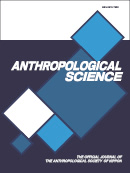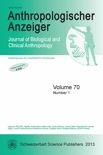
ANTHROPOLOGICAL SCIENCE
Scope & Guideline
Pioneering research that shapes the future of anthropology.
Introduction
Aims and Scopes
- Human Biological Diversity and Evolution:
Research focusing on the biological aspects of human beings, including studies on genetic variation, dental morphology, skeletal remains, and ancient genomes, which contribute to our understanding of human evolution and diversity. - Cultural and Social Anthropology:
Investigations into the cultural practices, social structures, and historical contexts of human populations, often integrating archaeological findings with contemporary social issues. - Interdisciplinary Approaches to Anthropological Research:
Encouraging the integration of methodologies and theories from various disciplines such as genetics, archaeology, and environmental science to enrich anthropological studies. - Paleoanthropology and Archaeology:
Focus on ancient populations through the study of archaeological findings, including human remains and artifacts, to gain insights into past human behaviors and societies. - Health and Disease in Historical Contexts:
Examination of health, diet, and disease patterns in historical populations, often utilizing bioarchaeological methods to assess the impact of environment and lifestyle on human health.
Trending and Emerging
- Genetic Analysis and Biotechnology in Anthropology:
An increasing trend in the application of genetic technologies, including mitochondrial DNA sequencing and genome-wide studies, highlighting the role of genetics in understanding human history and diversity. - Environmental and Dietary Studies:
A surge in research examining the relationship between human populations and their environments, particularly through stable isotope analysis and dietary reconstructions, which sheds light on adaptation and health. - Taphonomy and Bioarchaeology:
Growing interest in taphonomic studies and bioarchaeological approaches to understand the preservation of human remains and the implications for past human behaviors and cultural practices. - Social Implications of Genetic Testing:
Emerging discussions on the societal impact of direct-to-consumer genetic testing and ethical considerations surrounding genetic information, reflecting contemporary concerns in anthropology. - Interdisciplinary Studies on Ancient Societies:
A trend towards interdisciplinary research that combines archaeological, genetic, and anthropological methods to explore the complexities of ancient societies and their interactions.
Declining or Waning
- Traditional Ethnographic Studies:
There is a noticeable decrease in traditional ethnographic studies that solely focus on contemporary cultural practices without integrating biological or archaeological perspectives. - Focus on Western Populations:
Research centered exclusively on Western populations has waned, potentially reflecting a growing interest in a more global and diverse anthropological perspective. - Single-discipline Studies:
A decline in studies that do not employ interdisciplinary methods, as the journal increasingly emphasizes the integration of various scientific approaches in anthropological research.
Similar Journals

ANTHROPOLOGISCHER ANZEIGER
Enriching Understanding of Human-Animal RelationshipsANTHROPOLOGISCHER ANZEIGER, published by E Schweizerbart'sche Verlagsbuchhandlung, is a distinguished journal dedicated to the interdisciplinary fields of anthropology, animal science, and ecology, with a notable impact on advancing research in these areas. Since its inception in 1971, the journal has played a critical role in providing a platform for innovative research, fostering scholarly exchange, and enhancing the understanding of human and animal interactions and ecosystems. With its current quartile rankings—Q2 in Anthropology and Q3 in Animal Science and Zoology—it is well-positioned to serve as a vital resource for researchers, professionals, and students alike. Although it does not currently offer open access, the journal remains an essential asset for those looking to deepen their knowledge and contribute to ongoing discussions within these intersecting disciplines. For additional information, visit the publisher's office located at NAEGELE U OBERMILLER, SCIENCE PUBLISHERS, JOHANNESSTRASSE 3A, D 70176 STUTTGART, GERMANY.

Stratum Plus
Exploring the Depths of Humanity and TimeStratum Plus, published by HIGH ANTHROPOLOGICAL SCH UNIV, is a distinguished academic journal based in Moldova that focuses on the fields of Anthropology, Archeology, and History. With an impressive impact factor reflecting its stature—ranked in the Q2 category for both Anthropology and Archeology, and Q1 for Archeology in the arts and humanities—this journal is a vital resource for scholars, professionals, and students alike. The journal's comprehensive scope encompasses a wide array of interdisciplinary studies, making it a beacon for innovative research and critical discourse within these disciplines. Since its inception in 2014, Stratum Plus has strived to foster academic excellence and knowledge dissemination, thus playing a crucial role in shaping contemporary anthropological and archaeological thought. While currently not available as Open Access, the journal maintains a strong online presence, with access options available through institutional subscriptions. Located at ZIMBRULUI 10A ST, KISHINEV MD-2024, MOLDOVA, Stratum Plus invites contributors and readers to engage with cutting-edge research that continues to enrich the global academic community.

Boletin Antropologico
Fostering Intellectual Growth in AnthropologyBoletin Antropologico, published by UNIV LOS ANDES, is a vital academic journal dedicated to the field of anthropology, focusing on the diverse cultural practices, social structures, and historical contexts of societies, particularly within Latin America. With its ISSN of 0257-750X, this journal aims to provide a platform for researchers and scholars to disseminate their findings and engage in meaningful discussions that advance the understanding of anthropological issues. Although Boletin Antropologico currently does not follow an open-access model, it remains a significant resource for professionals seeking peer-reviewed content that reflects rigorous academic standards. With a commitment to fostering intellectual growth and collaboration among anthropologists, the journal serves as an essential reference for students and practitioners keen on exploring the rich tapestry of human cultures and societies.

Annual Review of Anthropology
Connecting Cultures Through Comprehensive ReviewsAnnual Review of Anthropology is a premier journal published by Annual Reviews, dedicated to providing comprehensive and authoritative reviews in the field of anthropology. Established with the goal of synthesizing essential research findings, this influential publication not only shapes contemporary anthropological discourse but also facilitates interdisciplinary dialogue within the broader realm of social sciences and cultural studies. With an impressive impact factor that places it in the Q1 category across multiple classifications, including Anthropology and Arts and Humanities, this journal is highly regarded by researchers and academics alike. The Annual Review of Anthropology has been a trusted resource for critical insights and transformative ideas, helping to advance the understanding of human societies from 1980 to the present. Although it does not offer open access, access to its articles is available through various academic institutions, ensuring that both seasoned scholars and students can benefit from its wealth of knowledge. With a Scopus ranking placing it in the top percentiles for relevant subjects, this journal is essential reading for anyone looking to stay at the forefront of anthropological research.

Relaciones
Connecting Ideas, Transforming Anthropology.Relaciones is a prestigious open-access journal published by the SOC ARGENTINA ANTROPOLOGIA, dedicated to the field of anthropology. Since its inception in 1937, this journal has served as a vital platform for disseminating innovative research and insights within the social sciences community. With both its print (ISSN: 0325-2221) and online (E-ISSN: 1852-1479) formats, Relaciones ensures widespread accessibility, empowering researchers, professionals, and students to engage with contemporary anthropological discourse. The journal aims to foster critical discussions that not only reflect on cultural and societal issues but also contribute to theoretical advancements in anthropological methodologies. By maintaining a commitment to quality and open access, Relaciones plays a crucial role in shaping the future of anthropology in Argentina and beyond, encouraging scholarly collaboration and enriching the academic landscape.

Anthropologie-International Journal of Human Diversity and Evolution
Illuminating the Spectrum of Anthropological ResearchAnthropologie-International Journal of Human Diversity and Evolution is a prominent peer-reviewed journal published by the esteemed MORAVIAN MUSEUM in the heart of the Czech Republic. With a focus on anthropology, this journal serves as a vital platform for the dissemination of innovative research that explores human diversity and evolutionary studies. The journal operates under a rigorous academic framework and is categorized in the Q3 quartile for anthropology in 2023, reflecting its significance in the field. Although it does not currently offer open access options, Anthropologie facilitates the exchange of knowledge through its carefully curated articles spanning diverse topics within human evolution. Its Scopus ranking (320 out of 502 in social sciences) underscores its role as a relevant source for scholars and professionals alike, fostering dialogue and advancements in understanding human diversity. Researchers, students, and practitioners can look forward to engaging content that not only enlightens but also inspires further inquiry into anthropological studies.

CURRENT ANTHROPOLOGY
Unveiling the Depths of Anthropology and ArchaeologyCURRENT ANTHROPOLOGY, published by the esteemed University of Chicago Press, stands as a premier journal in the fields of anthropology and archaeology, with an impressive impact factor that signifies its relevance and authority in the academic community. With both print (ISSN: 0011-3204) and digital formats (E-ISSN: 1537-5382), this journal provides a platform for groundbreaking research, theoretical advancements, and critical discussions that shape our understanding of human cultures and societies. Since its inception in 1962, CURRENT ANTHROPOLOGY has continually pushed the boundaries of knowledge and inquiry, earning a prestigious Q1 ranking in 2023 across multiple categories, including Social Sciences and Archaeology. Researchers and professionals alike rely on this journal not only for its rigorous peer-reviewed articles but also for its commitment to interdisciplinary approaches and innovative methodologies. While not currently offering open access, CURRENT ANTHROPOLOGY remains an essential resource for students and scholars eager to stay abreast of the latest developments in anthropological research.

Intersecciones en Antropologia
Stimulating critical discussions in anthropology.Intersecciones en Antropologia, published by the Universidad Nacional del Centro de la Provincia de Buenos Aires (UNICEN), Facultad de Ciencias Sociales, is a premier open-access journal in the field of anthropology, having established its presence since 2010. With an impressive impact factor and currently holding the distinguished Q1 quartile ranking in anthropology for 2023, this journal has quickly become a vital resource for scholars and practitioners alike, offering a platform for innovative research and critical discussion. The journal aims to advance anthropological scholarship by encouraging the dissemination of diverse perspectives and stimulating dialogue across geographical and cultural boundaries. Its open-access model, adopted in 2017, ensures that valuable research findings are accessible to a global audience, fostering collaboration and engagement within the academic community and beyond. Located in the vibrant cultural context of Argentina, Intersecciones en Antropologia serves as a conduit for significant anthropological dialogues, making it an essential read for those dedicated to understanding and contributing to the evolving landscape of social sciences.

Time & Mind-The Journal of Archaeology Consciousness and Culture
Advancing Interdisciplinary Insights on Human ExperienceTime & Mind - The Journal of Archaeology Consciousness and Culture, published by Routledge Journals, Taylor & Francis Ltd, stands at the intersection of archaeology and consciousness studies, revealing the intricate relationship between cultural practices and human cognition. With a robust ISSN of 1751-696X and an E-ISSN of 1751-6978, this esteemed journal plays a vital role in fostering interdisciplinary dialogue among scholars in the realms of anthropology and archaeology. Notably recognized for its rigorous academic standards, it achieved a commendable Q2 category ranking across various fields in 2023, including Anthropology and Archeology, alongside impressive Scopus rankings. As it continues to publish cutting-edge research from 2008 to 2024, this journal remains dedicated to exploring the nuances of human experience through the lens of archaeological evidence, making it an indispensable resource for researchers, professionals, and students alike seeking to deepen their understanding of the cultural dimensions of consciousness.

American Journal of Biological Anthropology
Advancing Insights into Evolutionary BiologyThe American Journal of Biological Anthropology, published by WILEY, is a premier journal in the field of biological anthropology, boasting critical insights into human biological diversity, evolution, and adaptation. With its ISSN 2692-7691, this journal has established itself firmly within the research community, achieving a Q1 ranking in key disciplines such as Anatomy, Anthropology, Archeology, and Paleontology as of 2023. This indicates its significant impact, with Scopus rankings placing it in the top tiers across diverse fields, including a stellar rank of 13th out of 113 in Paleontology. Offering open access possibilities, the journal facilitates wider dissemination of groundbreaking research and is committed to advancing knowledge that intersects genetics, epidemiology, and anthropology. Based in the United States, the journal continually fosters an international dialogue among researchers, professionals, and students eager to explore the complexities of human biology through a robust and interdisciplinary lens.